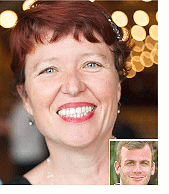Recently, I had the pleasure with David Cutler to speak to Rae Pica from Studentcentricity, BAM Radio's Internet educator radio show. Radio interviews are fairly new for me; I haven't been on the radio since Jennifer Moranda and I hosted a sports radio show in high school!
The interview pace zinged almost faster than my brain, but Cutler and I agreed on so much! Students need real writing tasks that they help choose with real audiences and real feedback. We both teach a class devoted to publishing (the Modes of Writing has been producing great stuff!) and trust that our students can handle real feedback that helps them grow as writers.
Please give the 10-minute radio interview a listen. I could use feedback on how to improve my performance in that particular format; it's so different that than an elevator speech or hour-long professional development.
You can read more about these ideas at Twitter: @SpinEdu, @RaePica1, @BAMRadioNetwork, and of course, me, at @AmyKConley .
 |
| David Cutler and I on Studentcentricity, BAM Radio |
The interview pace zinged almost faster than my brain, but Cutler and I agreed on so much! Students need real writing tasks that they help choose with real audiences and real feedback. We both teach a class devoted to publishing (the Modes of Writing has been producing great stuff!) and trust that our students can handle real feedback that helps them grow as writers.
Please give the 10-minute radio interview a listen. I could use feedback on how to improve my performance in that particular format; it's so different that than an elevator speech or hour-long professional development.
You can read more about these ideas at Twitter: @SpinEdu, @RaePica1, @BAMRadioNetwork, and of course, me, at @AmyKConley .
Comments
Post a Comment